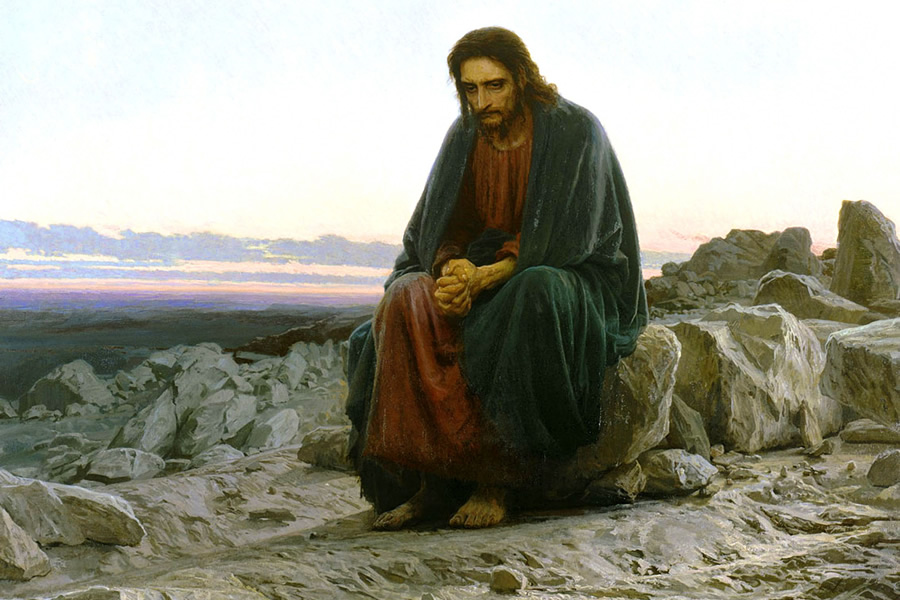
First Sunday of Lent
02-26-2023Weekly ReflectionDr. Scott HahnIn today’s epic Gospel scene, Jesus relives in His flesh the history of Israel. We’ve already seen that, like Israel, Jesus has passed through water and been called God’s beloved Son (see Luke 3:22; Exodus 4:22). Now, as Israel was tested for forty years in the wilderness, Jesus is led into the desert to be tested for forty days and nights (see Exodus 15:25).
He faces the temptations put to Israel: Hungry, He’s tempted to grumble against God for food (see Exodus 16:1–13). As Israel quarreled at Massah, He’s tempted to doubt God’s care (see Exodus 17:1– 6). When the Devil asks for His homage, He’s tempted to do what Israel did in creating the golden calf (see Exodus 32).
Jesus fights the Devil with the Word of God, three times quoting from Moses’ lecture about the lessons Israel was supposed to learn from its wilderness wanderings (see Deuteronomy 8:3; 6:16, 12–15).
Why do we read this story on the first Sunday of Lent? Because like the biblical sign of forty (see Genesis 7:12; Exodus 24:18; 34:28; 1 Kings 19:8; Jonah 3:4), the forty days of Lent are a time of trial and purification.
Lent is to teach us what we hear over and over in today’s readings. “Call upon me, and I will answer,” the Lord promises in today’s Psalm. Paul promises the same thing in today’s Epistle (quoting Deuteronomy 30:14; Isaiah 28:16; Joel 2:32). This was Israel’s experience, as Moses reminds his people in today’s First Reading: “We cried to the Lord...and He heard.” But each of us is tempted, as Israel was, to forget the great deeds He works in our lives, to neglect our birthright as His beloved sons and daughters.
Like the litany of remembrance Moses prescribes for Israel, we should see in the Mass a memorial of our salvation, and “bow down in His presence,” offering ourselves in thanksgiving for all He has given us.
A service of the St. Paul Center for Biblical Theology www.SalvationHistory.com.
El primer domingo de Cuaresma nos presenta a Jesús conducido por el Espíritu al desierto para ser tentado por el diablo. El marco geográfico del desierto, lugar inhóspito y antagónico del Edén, es muy elocuente. De algún pasaje de la Sagrada Escritura puede suponerse la creencia judía en cierto espíritu maléfico del desierto llamado Azazel (cfr. Lv 16,10 y Tb 8,3). Jesús sería impulsado así al ámbito del tentador. Además, el desierto fue lugar de prueba para el pueblo elegido. El Señor acude para vencer allí donde Israel sucumbió.
Jesús ayuna “durante cuarenta días con cuarenta noches”. Es lo que conmemora la Cuaresma. Y esta acción penitencial del Señor está cargada de simbolismo: cuarenta días y cuarenta noches duró el castigo del diluvio (cfr. Gn 7,4); cuarenta días y cuarenta noches pasó Moisés en la nube del Sinaí, sin comer ni beber, suplicando a Dios por el pueblo (cfr. Dt 9,25), antes de entregarle la Ley (cfr. Ex 24,18); también pasó Elías cuarenta días y cuarenta noches, sin comer ni beber, caminando hasta el monte Horeb para encontrarse con el Señor (1R 19,8); y en especial, durante 40 años habitó Israel en el desierto, en medio de pruebas y tentaciones, como castigo a los 40 días que dedicó a explorar la tierra por su cuenta, sin contar con Dios (Nm 14,34).
Después de ayunar, Jesús se muestra hambriento, en aparente privación de ayuda divina y poder material. El tentador pretende entonces que Jesús caiga en alguna forma de intemperancia, avaricia o idolatría, en las que hace caer a los hombres, quienes utilizan o rechazan a Dios para exaltarse a sí mismos. El diablo cita retorcidamente las Escrituras con las que Jesús cumple siempre la voluntad de su Padre. Si eres el Hijo de Dios, le viene a decir, usa la fuerza divina para resolver la indigente condición humana que has asumido. Esta misma sugestión llegará a su culmen en la cruz.
Todos vivimos de una forma u otra cada día estas pruebas del desierto. Como explicaba Benedicto XVI, “el núcleo de toda tentación – como se aprecia aquí– es dejar al margen a Dios, el cual, comparado con todo lo que parece urgente en nuestra vida, es visto como secundario, cuando no superfluo y molesto”.
opusdei.org
BACK TO LIST